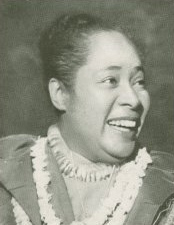Juanita Long Hall, a 20th Century actor and singer, was born in Keyport, New Jersey on Nov. 6, 1901 to an African-American father, Abram Long, and an Irish American mother, Mary Richardson. Raised by maternal grandparents, Long attended New York City, New York’s Juilliard School of Music. While a teenager, she married Clement Hall, who died in 1920s. The couple had no children.
Hall’s early career was in singing and choir directing. From 1935 to 1944 she directed the Works Progress Administration (WPA) Chorus. From 1941 to 1942 she also directed the Westchester (New York) Chorale and Dramatics Association. In the early 1940s she led the Juanita Hall Choir, which performed on radio with Rudy Vallee and Kate Smith and in 1949 the Juanita Hall Choir performed in the film Miracle in Harlem.
In 1935 Hall performed with the Lafayette Players, an African American theatrical troupe. Her first major acting role came in 1943 when she appeared on Broadway in The Pirate. Other Broadway acting opportunities came and she performed in Sing Out, Sweet Land, Saint Louis Woman, Deep Are the Roots, The Secret Room, Street Scene, and The Ponder Heart, all between 1943 and 1956.
Hall’s major break came in 1949 when she was cast as “Bloody Mary” in Richard Rogers and Oscar Hammerstein’s South Pacific at New York’s Majestic Theatre. In 1950 Hall became the first African American to win a Tony Award when she was named Best Supporting Actress for her role in South Pacific. Hall played “Bloody Mary” for over 1,900 performances of South Pacific before beginning a brief a career as a nightclub singer performing mostly in Greenwich Village venues. In the early 1950s Hall starred in the radio soap opera The Story of Ruby Valentine.
In 1954 Hall was cast as a West Indian brothel keeper in Harold Arlen’s House of Flowers with Pearl Bailey and Diahann Carroll. In 1958 she played a Chinese-American marriage broker in Rogers and Hammerstein’s Flower Drum Song. She reprised that role in the 1961 film version of the play. In 1958 Richard Rogers requested Hall to again play Bloody Mary in the film version of South Pacific which was shot on the island of Kauai in Hawaii. Hall’s television appearances in the 1950s and early 1960s included The Ed Sullivan Show, The Coca-Cola Hour, The Perry Como Show.
Affected by diabetes with failing eyesight and health, Hall performed in A Woman and the Blues, featuring her nightclub and Broadway acts in 1966. Her condition led the Actors Fund of America to stage a benefit performance on her behalf in 1967. A year later, on February 28, 1968 Juanita Hall died in Bay Shore, Long Island. She was 66 at the time of her death.

